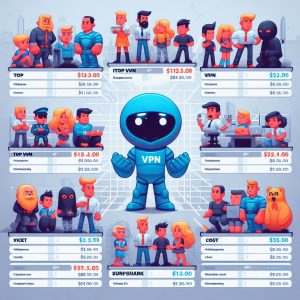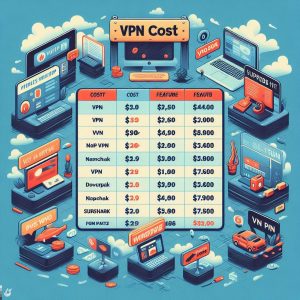I. Introduction to VPN Cost
A Virtual Private Network (VPN) has become an essential tool for internet users to protect their privacy and security online. As VPN services require significant infrastructure and resources to operate, costs are an important factor to consider when choosing one. This article will provide an in-depth look at various elements that affect the pricing of VPN services.
First, we will define what a VPN is and why examining the costs associated with them matters. A VPN creates an encrypted tunnel for internet traffic between a user’s device and a server operated by the VPN provider. This hides the user’s IP address and online activity from the websites they visit or cybercriminals that may be snooping on public Wi-Fi networks. Without taking cost into account, users may choose a VPN that does not actually meet their privacy and security needs.
II. Factors Affecting VPN Cost
Many technical and business factors determine how much VPN providers need to charge their customers. By understanding what goes into offering VPN services, users can better evaluate the costs in context.
Server Maintenance Fees
VPN providers incur significant server expenses in order to facilitate encrypted tunnels for their customers’ traffic. Maintaining large server networks in data centers globally requires:
- Rent for rack space and bandwidth
- Hardware costs for servers and networking equipment
- Electricity and cooling costs for power-hungry server farms
- IT personnel salaries for server admin and management
The more servers a VPN company operates, the higher these fees become. More servers allow supporting more connected users at once. So larger VPN services pass down these infrastructure costs to subscribers through higher monthly rates or data limits.

Subscription Plans
Most consumer VPNs offer tiered pricing plans based on constraints like connection speed, number of simultaneous device connections, server access, and amount of data. Basic plans around $3 – $10 per month usually limit speeds and server options. More expensive premium plans around $10 – $15 lift these restrictions but cost substantially more annually.
Some VPNs also impose monthly data caps on lower-priced offerings, after which speeds throttle. So matching usage habits to the restrictions of specific pricing tiers can prevent paying for unnecessary capacity. Paying yearly instead of monthly can also save 15-30% with most VPN providers.
Additional Features and Services
Besides basic VPN tunneling, providers offer additional capabilities for an incremental charge:
- Advanced encryption protocols like Wireguard to bolster security
- Onion routing via The Onion Router (Tor) network
- Split tunneling to exclude specific apps or sites from the VPN
- Multi-hop connections chains through multiple servers
- Custom proprietary protocols to avoid deep packet inspection (DPI)
- Sockets Layer (SSL) via TCP port 443 to bypass firewall blocks
These features improve privacy but most come at a premium. Average users may not require them, so opting for cheaper basic VPN plans without extras can save money.
III. Cost of Using Outline VPN
Outline VPN was created by internet policy non-profit Jigsaw to make VPN access more widely available for free. For individual users, Outline costs nothing. But for entities operating Outline servers, there are varying infrastructure expenses.
Free Access for Individual Users
Jigsaw developed and maintains Outline servers, which individuals can access free of charge after completing a short signup. Outline is available as iOS, Android, and Windows client apps. This allows general home and work usage with 512MB daily data limits.
Jigsaw receives funding from its parent company, Alphabet Inc. So Outline does not show advertisements, sell user data, set up multilevel affiliate structures, or employ other monetization strategies. Individual user access will thus remain free into the future thanks to Jigsaw’s nonprofit model.
Server Management Costs for Administrators
While individuals can use Outline at no cost, entities wishing to run their own Outline servers for larger groups shoulder the infrastructure burdens. Outline offers customizable server software that companies, universities, or other large organizations can install on their own infrastructure to route their members’ traffic.
This local server model improves speeds and offers greater data control. But it also comes with hefty system, maintenance, and management fees outlined below:
- Cloud compute instance charges – Outline server capacity depends on cloud infrastructure budgets. Running servers on Google Cloud, AWS, or Azure accrues hourly usage fees that quickly multiply with large user bases.
- Technical personnel – Managing servers requires dedicated engineering staff to keep software updated, provision capacity, monitor workloads, tune performance, and maintain security. These labor costs also compound with wider deployment scale.
So while Outline server software itself if free because Jigsaw developed it, supporting underlying infrastructure still necessitates substantial capital investment by larger institutional VPN operators.

Pricing Plans for Different User Categories
Acknowledging infrastructure barriers of self-hosting, Jigsaw launched Outline Enterprise, a paid version providing managed hosting and technical support. Pricing depends on number of users:
Personal – Individual accounts are always free because Jigsaw subsidizes access costs. Rate limits apply but no other constraints for personal security and privacy.
Team – Groups under 50 users cost $6 per member per month. Scales up linearly so 500 users are $10 each per month. Includes technical assistance and priority app updates from Jigsaw.
Business – Over 500 employee pricing is fully custom. Starts at $15 per user monthly but larger data and support needs require customized enterprise quotes. Highest infrastructure expenses but also direct vendor management from Jigsaw engineers.
This graduated pricing acknowledges that larger organizations accrue bigger technical burdens when routing many employee connections. So costs grow appropriately with wider service scale to account for managing greater server and traffic volumes.
IV. Comparison with Other VPN Services
To contextualize Outline’s unique free offering for individuals against standard market rate plans, we will contrast major paid VPN alternatives and their pricing models.
Cost Comparison with Popular VPN Providers
The table below summarizes monthly and yearly costs across top consumer VPN platforms:
| Provider | Starting Monthly Price | Cheapest Yearly Price |
|---|---|---|
| NordVPN | $3.29 | $69 for 2 years |
| ExpressVPN | $8.32 | $100 for 1 year |
| CyberGhost | $2.15 | $49 for 2 years |
| Private Internet Access | $2.19 | $69 for 2 years |
| IPVanish | $3.25 | $39 for 1 year |
| TunnelBear | $3.33 | $90 for 2 years |
| Windscribe | $1 | $81 for 3 years |
Outline is clearly the only free option, while most other reputable vendors charge recurring fees averaging ~$3 – $10 monthly. Year-long contracts offer 15-30% savings but still tally in the hundreds of dollars over a commitment term.
Based on server count metrics:
- NordVPN (~5,500), ExpressVPN (~3,000), CyberGhost (~7,000), and PIA (~10,000) lead for scale
- Windscribe (~50) and TunnelBear (~20) trail significantly
So paying more for the largest providers translates to expanded infrastructure and potentially faster speeds supporting more simultaneous connections. Whether thousands of servers offer any practical advantage is debatable though for the average subscriber.
Unique Features and Pricing Models of Different VPN Services
Besides base VPN tunneling, some providers differentiate via proprietary functionality that incurs additional fees:
Split Tunneling – ExpressVPN charges $6/month extra for split tunneling to exclude specific apps from the VPN tunnel. But this feature is now free for many competitors like NordVPN.
Double VPN – Double encryption via routing through two VPN servers costs 30% higher base fees with NordVPN. Useful for sensitive traffic security but overkill for most.
Cloud Hosting – Hosting virtual machines inside cloud server instances located in certain countries can enable forbidden content access. But associated compute charges plus VPN costs means drastically higher potential bills.
TOR Integration – TunnelBear offers an expensive add-on bundle integrating TOR browser access to .onion dark web sites, which may aid anonymity but reduce speeds.
Unlimited Connections – Usually only 3-5 device connections are allowed simultaneously. Removing this constraints with TunnelBear multiplies costs by nearly 3x.
For average users, caution is warranted with premium features to ensure they offer actual utility proportionate to added expenses.

V. Tips for Cost-Effective VPN Usage
By understanding technical determinants of VPN pricing and where providers overlap or differ in capabilities offered, we can optimize subscription plans for better cost efficiency.
Optimizing VPN Usage to Minimize Costs
Follow these guidelines to reduce unnecessary VPN expenses:
- Choose lowest tier plan with enough speed and data to cover usage needs rather than over-purchasing capacity. Re-assess periodically as needs evolve.
- Use free VPNs like Outline for basic encryption of casual personal browsing rather than subscribing to a paid service.
- Enable auto-connect only selectively for sites and apps transmitting sensitive data rather than entire device traffic.
- Set client apps to disconnect from VPNs when accessing streaming sites to avoid throttling imposed by geographically restricted content.
- Purchase yearly contracts instead of monthly plans for 15-30% savings and set calendar reminders to evaluate cheaper alternatives annually.
- Verify free VPN provider claims regarding data policies, technical audits, server infrastructure scale, and whether monetization structures subsidize operations sustainably long-term without eventual fees.
Following these cost saving guidelines stems unnecessary excess VPN expenses while still maintaining security and privacy.
Evaluating the Cost-Benefit of Different VPN Features
When assessing pricing differences across VPN offerings, scrutinize whether additional functionality merits heightened fees:
- Question if thousands more servers meaningfully improve experience for your usage patterns.
- Check if split tunneling would optimize costs by excluding traffic streams benefiting minimally from encryption.
- Avoid unnecessary double encryption which doubles expenses without substantially improving security further for most threat models.
- Estimate expected cloud hosting server runtimes when contemplating shifting workloads into VPN-connected cloud infrastructure and weigh considerably higher compute billing impacts.
Billing premiums for VPN platform add-ons often outweigh incremental value delivered. Prioritizing core security and privacy capabilities over unnecessary extras simplifies choice while lowering yearly costs.
VI. Conclusion
In closing, evaluating VPN options including Outline against standard market alternatives reveals key considerations around pricing models and how technical factors drive operational expenses for providers. We summarize salient learnings here:
When subscribing to commercial VPNs, remember larger server networks improve capacity and speeds but raise monthly fees, while top providers average $3 – $10 depending on restrictions. Annual billing saves 15-30% but may lock users into unnecessary long-term recurring costs.
Conversely, Outline’s free tier leverages funding from parent Alphabet to remove financial barriers for individuals. But self-hosting Outline servers accrues substantial infrastructure and management overheads proportional to user populations for bigger entities. Outline Enterprise pricing acknowledges these determinants, scaling up linearly beyond 50 seats.
Optimizing usage habits, plan tiers selected, unwarranted features, and contract duration saves average consumers significant VPN expenditures over time without sacrificing core security and privacy. And periodic reevaluation against alternative offerings like Outline remains prudent in a shifting marketplace. Applying these lessons amplifies cost efficiencies when subscribing to paid VPN services.